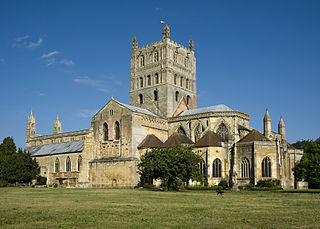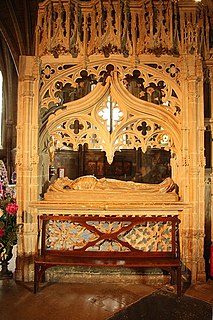Related Research Articles

The Abbey Church of St Mary the Virgin, Tewkesbury–commonly known as Tewkesbury Abbey–is located in the English county of Gloucestershire. A former Benedictine monastery, it is now a parish church. Considered one of the finest examples of Norman architecture in Britain, it has the largest Romanesque crossing tower in Europe.

Thomas de Beauchamp, 12th Earl of Warwick, KG was an English medieval nobleman and one of the primary opponents of Richard II.
Richard de Clare, 5th Earl of Hertford, 6th Earl of Gloucester, 2nd Lord of Glamorgan, 8th Lord of Clare was son of Gilbert de Clare, 4th Earl of Hertford and Isabel Marshal. He was also a powerful Marcher Lord in Wales and inherited the Lordship of Glamorgan upon the death of his father. He played a prominent role in the constitutional crisis of 1258–1263.

Alien priories were religious establishments in England, such as monasteries and convents, which were under the control of another religious house outside England. Usually the mother-house was in France.

William Talbot was an English Anglican bishop. He was Bishop of Oxford from 1699 to 1715, Bishop of Salisbury from 1715 to 1722 and Bishop of Durham from 1722 to 1730.

John Wakeman was an English Benedictine, the last Abbot of Tewkesbury and first Bishop of Gloucester, both posts in the English county of Gloucestershire. In the earlier part of his life he went by the name John Wiche.
Frances Hyde, Countess of Clarendon, born Frances Aylesbury, was an English peeress. As the mother of Anne Hyde, she was mother-in-law to James II and VII, the deposed king of England, Scotland, and Ireland, and the maternal grandmother of Mary II and Queen Anne.
Chelsea College was a polemical college founded in London in 1609. This establishment was intended to centralize controversial writing against Catholicism, and was the idea of Matthew Sutcliffe, Dean of Exeter, who was the first Provost. After his death in 1629 it declined as an institution.
Adam of Damerham, was a Benedictine monk of Glastonbury Abbey, who wrote a history of the abbey, and was active in the ecclesiastical politics of his time.
Adam de Senlis, also called Adam of Evesham, was a Benedictine monk who became abbot of Evesham Abbey.
Robert Marmion, 3rd Baron Marmion of Tamworth was an Anglo-Norman nobleman and itinerant justice. He was reputed to have been the King's Champion but his grandson, Phillip, is the first Marmion to have a solid claim to this. Robert was descended from the lords of Fontenay-le-Marmion in Normandy, who are said to have been hereditary champions of the Dukes of Normandy.
William Benson was an English Benedictine, the last Abbot of Westminster and first Dean of Westminster. He was a friend of Thomas Cranmer, and belonged to the evangelical circle around Cranmer that included Thomas Goodrich, Hugh Latimer and Thomas Thirlby.

John Bacon (1777–1859), also known as John Bacon the Younger, or Junior, to distinguish him from his equally famous father, was an English sculptor.
Nicholas Brigham, is mentioned by Bale as a Latin scholar and antiquarian, who gave up literature to practise in the law courts, and who flourished in 1550. To this Pits adds that he was no common poet and a good orator, and that in 1555 he built a tomb for the bones of Geoffrey Chaucer in Westminster Abbey. Later writers have taken this to be Nicholas Brigham, a "teller" of the exchequer, who died in 1558.
Richard Bromsgrove, was a monk of the Benedictine abbey of Evesham.

Sir Henry de Baliol of Cavers was Chamberlain of Scotland.
Richard de Beresford or Bereford was an English-born cleric who held high political office in Ireland in the early fourteenth century as Lord High Treasurer of Ireland and Lord Chancellor of Ireland.
John Theyer (1597–1673) was an English royalist lawyer, writer, antiquary and bibliophile.
Sir William Trussell was an English politician and leading rebel in Queen Isabella and Roger Mortimer, 1st Earl of March's rebellion against Edward II. William acted as Speaker of the House of Commons and renounced the allegiance of England to Edward II, forcing his abdication, and became King Edward III's Secretary.
Sir Robert de Berkeley, 3rd feudal baron of Berkeley was an Anglo-Norman baron and justice.
References
- . Dictionary of National Biography . London: Smith, Elder & Co. 1885–1900.
- Attribution
![]() This article incorporates text from a publication now in the public domain : "Barking, Richard de". Dictionary of National Biography . London: Smith, Elder & Co. 1885–1900.
This article incorporates text from a publication now in the public domain : "Barking, Richard de". Dictionary of National Biography . London: Smith, Elder & Co. 1885–1900.